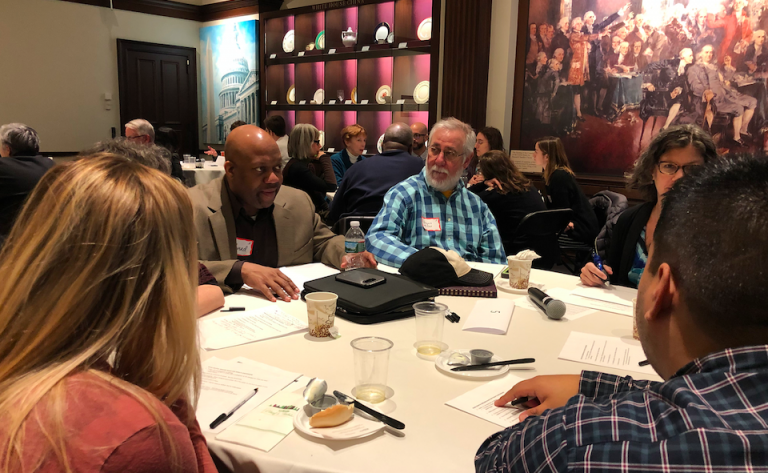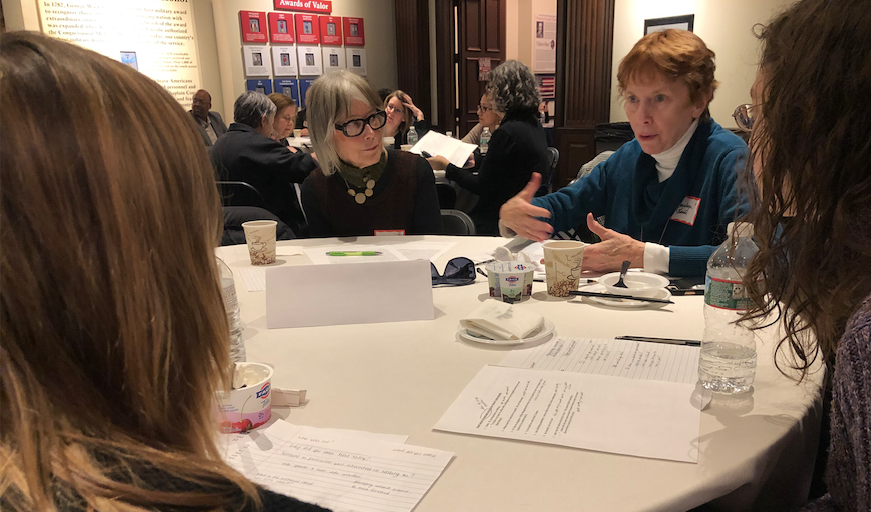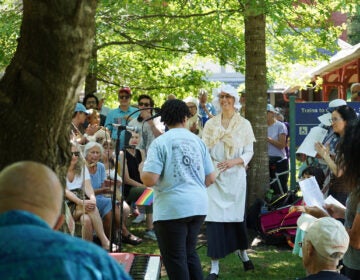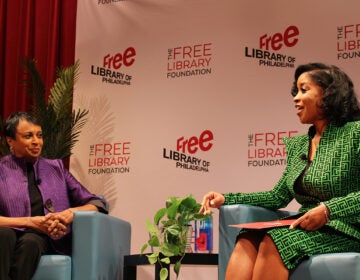‘Can We Talk?’ bridges gap between polarizing debates, constructive conversation
The Penn Project for Civic Engagement hosted a discussion and workshop for city residents on how to have meaningful political debate with people they might disagree with.

Attendees engage with each other during a discussion and workshop for city residents on how to have meaningful political debate with people they might disagree with. The event was hosted by The Penn Project for Civic Engagement and held at the Liberty Museum in Philadelphia on Saturday (Provided)
Beneath a large painting of the Founding Fathers signing the U.S. Constitution, dozens of Philadelphians engaged in a discussion geared toward promoting a democratic republic.
As part of its “Can We Talk?” programming, the Pennsylvania Project for Civic Engagement brought Philadelphia residents from various age groups, careers, and political beliefs together Saturday to discuss how to have civil dialogue with people they might disagree with.
The Penn Project has been hosting structured civic-dialogue workshops since 1995. It has recently become affiliated with the Committee of Seventy, a nonpartisan advocacy organization focused on Philadelphia politics.
The event, held at the National Liberty Museum in Old City, had two parts: a morning conversation about the polarizing issues that face the United States today, and an afternoon session focusing on tips and tricks for working with people — whether within someone’s family or in the workplace — in a way that isn’t divisive.
“When I get engaged in a conversation with somebody and they are pushing against me, rather than push back, I try to think what circle I can draw that brings us both together? Where might we find some commonality?” said Harris Sokoloff, Penn Project’s co-founder.
“Can We Talk?” programming began following the 2016 presidential election, after a professor at the University of Pennsylvania told Sokoloff that he had conservative students who felt uncomfortable speaking about their political beliefs because of the university’s liberal leaning.
That prompted discussion of how to create a conversation in which students could talk about politics from different viewpoints in a way that was constructive and productive.
Since then, the program has expanded to other colleges. Saturday’s event was the first workshop for the general public.
“The people that come are obviously a self-selected audience, and they are hungry for constructive political conversation,” said Sokoloff, who is also a Penn professor. “They’re tired of political conversation that decays into name-calling or into position-grandstanding. They want something that is constructive and helpful.”
A big part of facilitating dialogue in the workshop — and constructive dialogue with people who have differing opinions in general — was laying ground rules. These included such ideas as listening is as important as talking, giving everyone a chance to talk, building on each other’s ideas, and, if you disagree with someone, don’t try to prove why you’re right, try to understand why you disagree.
“We also structure the conversations to start with personal story and then go in more deeply,” Sokoloff said. “Starting that way gently gets people comfortable talking with each other, gets a sense of vulnerability that it’s OK, that we can be brave and have this conversation and take a risk.”

Samantha Stein, a health and societies student at Penn, recalled a difficult conversation she had with a Lyft driver.
“I was talking to a friend about our views on having children, and myself and my friend were saying we definitely don’t want to have children,” Stein said. “And the Lyft driver says, `So you don’t want to contribute to humanity?’ ”
The statement caught her off guard, Stein said. But in her response, she hoped to understand where the driver was coming from, so she asked what it meant to him to contribute to humanity.
At Saturday’s event, Stein asked her peers what other questions she might have posed. Those joining her at a five-person table suggested asking how the driver thought children contributed to society, and also putting into context whether he had children.
“I think a lot of how the conversation proceeds is predicated on the little, tiny responses you give to when people say things,” Stein said.
Ale Muniz, a volunteer with Draw The Lines PA, a civic-engagement project about gerrymandering, participated in a conversation about how to ask questions to better understand people’s perspectives on divisive issues such as gun-control reform, health care, or immigration.
Muniz said she grew up in Texas, where guns are strongly tied to many people’s identity.
“I would be interested in asking questions like, ‘What do guns mean to you?’ ” Muniz said. “‘What value or what is important to you about having a gun?’ To kind of clarify the stance, the personal level, without inserting my own judgment on it.”
Sokoloff pushed the table to go deeper into Muniz’s questioning: How would you ask someone who feels connected to guns about whether there should be limits or controls on gun ownership?
“I would try to get them to think about it a little more broadly in terms of their surroundings, asking them questions like ‘What do you think guns mean to other people?’ ” Stein said. “Things like that, to get them thinking beyond themselves, because I think when people think within their immediate families, it’s really easy to find security there.”
Steven Scott Bradley, who runs a commercial-insurance brokerage in Philadelphia, said the range of age groups — from recent college graduates to retired individuals — helped bring a wide array of perspectives to his table.
One of his biggest takeaways from the workshop was listening.
“The listening trait is something that we always have to refresh up on, and different points of views are important, but again it’s how do you want to grow?” Bradley said. “I think you have to constantly refresh those skills in order to have a better America and a better city.”
Randy Duque, a deputy director at the Philadelphia Commission on Human Relations, said the way questions were structured “made us open up and think about what are ways that we individually can address another person with a different viewpoint. What are questions we can ask?
“Even though it’s kind of intuitive,” Duque said, “it really brought it out … like here’s a safe way to ask someone who supports a different candidate why they do it, but then [also] getting feedback from everyone else at the table.”
Editor’s Note: Steven Scott Bradley is a WHYY board member.
WHYY is your source for fact-based, in-depth journalism and information. As a nonprofit organization, we rely on financial support from readers like you. Please give today.





